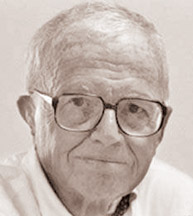On writing well
K S Sivakumaran
All journalists, media people, teachers and those who care for
writing English well might have read William Zinsser or at least heard
about him in their course of studies. If not I wish to review his book
for the benefit of many people who struggle hard to write in simple
language. This applies particularly to young academics that have studied
in the indigenous languages but make an effort to communicate in
English.
|

William Zinsser |
As a journalist, writer, teacher and even broadcaster I found his
book very absorbing and of practical use. If you have not read it so
far, please try to read and benefit from this classic guide to writing
non-fiction. The writer is an American but he is critical of the
loquacious manner in which most politicians, bureaucrats and diplomats
write. I also like the book The Critical Sense by James Reeves, an
English poet from the United Kigdom (UK)
William Zinsser’s book was simply called On Writing Well was first
published in 1976 by HarperCollins Publishers of New York. It might have
seen several editions since then. I am told it is also available as an
audio book.
The book is neatly divided into Four Parts: Principles, Methods,
Forms and Attitudes with an Introduction by the writer to the 2001
edition which I studied.
Since it is clearly stated that “No part of this book may be used or
reproduced in any manner whatsoever without written permission except in
the case of brief quotations embodied in critical articles and reviews”,
I can only quote a few advises in this brief review.
My intention is to just introduce the book so that many may seek it
and judge for themselves the importance of this excellent book from my
point of view.
Let us take two statements from the writer’s introduction first.
“Writing is not a skill that some people are born with and others are
not, like a gift for art or music. Writing is talking to someone else on
paper. Anybody who can think clearly can write clearly, about any
subject at all. That has always been the central premise of this book.”
“Ultimately, however, good writing rests on craft and always will.”
Further relevant quotes:
“Good writing has an aliveness that keeps the reader reading from one
paragraph to the next, and it is not a question gimmicks to
‘personalize’ the author. It is a question of using the English language
in a way that will achieve the greater clarity and strength”
Most people are under the impression that if you write in simple
language, you lack the vocabulary and depth. They don’t remember the
saying “brevity is the soul of art.” The bottom line is if you think
clearly naturally tour writing will be clear and communicative. The
right word at the right place will naturally fall in place if one thinks
in clear terms.
One more quotation from the book:
“But the secret of good writing is to strip every sentence to its
cleanest components. Every word that serves and function, every passive
construction that leaves the reader unsure of who is doing what- there
ate the thousand and one adulterants that weaken the strength of a
sentence. And they usually occur in proportion to education and rank.”
Young people in particular should read this book in understanding
what is known as style as well.
Since ‘Style is the Man’ we should remain true to ourselves and then
our style would become the expression of our personality.
Please also read E B White’s book on Style for further clarification.
In Sri Lankan English writing of those who write in the newspapers
and other specialized journals, I always enjoy the style of writing of a
few people. If young people could read some of their writings they can
identify good writing. Some names I could remember and whose writing I
enjoyed were:
Jayantha Padmanaba, Regi Siriwardene, Mervyn de Silva, Gamini Corea,
Lester James Peiris, Godfrey Goonathilake, Bradman Weerakoon, Fred de
Silva, S Pathirvithane, A J Gunawardene, Carlo Fonseka, Tissa Jayatileke,
Jayantha Dhanapala, Wimal Dissanaike, Ajith Samaranaike, Sarath
Amunugama, Prabath Sahabandu and maybe a few others.They thought clearly
and therefore they wrote clearly.
I must also add that even though I beg to disagree with most of the
hardened views of Nalin de Silva, he among the Sinhala oriented (meaning
he writes in Sinhala too) writers and also Gunadasa Amarasekea, (even
though one might detest his ultra extremist views) think clearly and
therefore they write clear effective English. Unfortunately they are all
males. But among the creative writers there are many (both women and
men) whose style of writing in English pleases me for their acute
craftsmanship.
Since this article is primarily meant for teenage readers of the
Punch page, I suggested some names of writers who write well in English.
[email protected]
|



